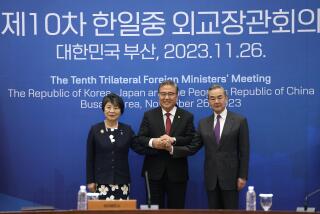China, South Korea set to visit Japanâs quake-tsunami region
Reporting from Tokyo â In a gesture that experts believe may improve the often testy relations between Japan and two of its neighbors in Northeast Asia, the leaders of China and South Korea this weekend will visit areas devastated by the March 11 earthquake and tsunami.
Chinese Premier Wen Jiabao and South Korean President Lee Myung-bak will tour Japanâs Fukushima prefecture, where workers are still struggling to stop the radiation leaks at a stricken nuclear power plant. They will also visit the city of Sendai, which suffered enormous damage in the magnitude 9 quake and the tsunami it spawned.
The visits come as the three governments hold their fourth annual summit in Tokyo, where the three leaders are expected to announce plans for enhanced disaster management and nuclear safety.
Officials in Beijing said Wen decided to tour the quake-hit region as a demonstration of his nationâs commitment to helping rebuild it. However, China rejected a proposal by Japanese Prime Minister Naoto Kan to hold the summit in that area, a suggestion aimed at easing fears about the radiation.
Both China and South Korea sent rescue teams to Japan after the disaster, which killed nearly 20,000 people and left tens of thousands homeless.
Many Chinese also expressed their condolences to the Japanese people in emails sent to the website of the Japanese Embassy in China.
The goodwill led the Japanese ambassador in Beijing to thank China on national television.
Wen is seeking to improve ties with Tokyo, which worsened last year after Japanâs coast guard arrested the captain of a Chinese fishing trawler whose boat had collided with Japanese patrol ships near islands that both nations claim.
Educators in China said Thursday that Wenâs trip could prove a major step in bolstering ties.
âIt will definitely bring an improvement in Sino-Japan relations. Itâs going to have positive significance on the emotions and feelings among people from both countries,â said Jin Limbo, director of Asia-Pacific research at the China Institute of International Studies.
Though next year marks the 40th anniversary of the nationsâ establishment of diplomatic relations, their past long been marred by Japanâs 1930s occupation of China, which included the slaughter of tens of thousands in the city of Nanjing.
South Korea has its own bitter history with Japan, including nearly four decades of occupation before World War II. Although the South Korean Red Cross donated $40 million to Japan after the quake â one of the largest by a nongovernment entity â the nationsâ relations are often marked by a sense of rivalry.
Many South Koreans were angered recently when Tokyo approved new school textbook content that reiterates Japanâs territorial rights to islands claimed by both nations.
Nicole Liu of The Timesâ Beijing bureau and Jung-yoon Choi of the Seoul bureau contributed to this report.
More to Read
Sign up for Essential California
The most important California stories and recommendations in your inbox every morning.
You may occasionally receive promotional content from the Los Angeles Times.











